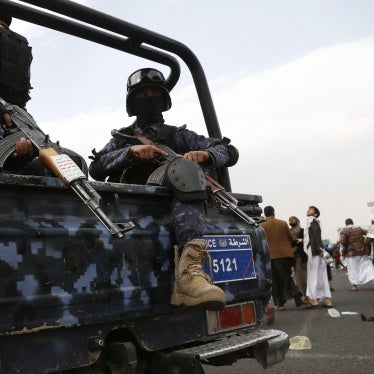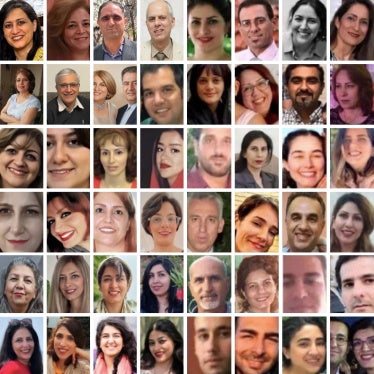Egyptian authorities should immediately release at least 29 young activists who were arrested yesterday in Nag’ Hammadai while on their way to pay their condolences to the families of six Coptic Christians shot and killed on the Coptic Christmas Eve, Human Rights Watch said today.
Human Rights Watch called on the government to prosecute all those responsible for the Christmas Eve attacks in fair proceedings and to institute a public campaign against sectarian violence.
“The Egyptian authorities should be focusing on the causes of the tragic shooting of six Coptic Christians,” said Sarah Leah Whitson, Middle East director at Human Rights Watch. “Instead, they’re arresting activists whose efforts to express their condolences is an important step toward healing sectarian fractures.”
Egyptian security officials arrested the activists, bloggers, and members of political parties when they arrived in the southern town of Nag’ Hammadi where they planned to visit the families of the shooting victims to show solidarity and to seek information about the situation. The group included prominent bloggers, among them Wael Abbas, Mohamed Khaled, Esraa Abdel Fattah, Ismail al-Iskandrani, and Ahmed Badawy, and members of the Democratic Front Party, including Sameer Akel and Nasser Abdel Hameed. The group included eight women, seven of them Egyptians and one French citizen, whom security officials are detaining apart from the men.
Lawyers from the Egyptian Center for Economic and Social Rights reported yesterday evening that the Qena prosecutor was questioning the detained activists, and some have been charged with demonstrating illegally, chanting slogans against the state, and causing disorder. Members of the group who managed to communicate with friends before security officers took their cell phones away said the officers arrested them when they arrived at the train station, and the group had not had time to engage in any activities.
There was a heavy security presence in the area because of the visit of Hamdi Zaqzouq, the minister of religious endowments, and Sheikh Mohamed Tantawy, the mufti of Egypt, the highest Muslim religious authority in the country, who had traveled to Nag’ Hammadi to pay condolences to Bishop Kirollos, the head of the Coptic Christian community in the area.
On January 6, a car carrying the gunmen drove past a church in Nag’ Hammadi and shot at a group of Coptic Christians as they left a Christmas Mass. Six Copts and one Muslim guard died in the attack. On January 8, security officials arrested Mohamed Hassan, Handawi Mohamed, and Qershi Abul Hagag in connection with the attack. The following day, the North Qena prosecutor charged them with "premeditated murder, putting the life of citizens in danger, and damage to public and private property." Judicial sources told the newspaper El Masry el Youm that the North Qena prosecutor had nearly concluded his investigations and would transfer the three suspects before a criminal court over the next days.
“Prosecuting those responsible for this vicious attack is an important and necessary first step,” Whitson said. “But if Egypt is to address seriously the festering religious hatred in the country, the government needs to implement a serious campaign of respect for religious diversity and equal rights for all.”
The authorities’ usual approach to sectarian violence has been to arrest those involved, but to urge the parties to settle the case privately by paying compensation. Even where incidents are initially investigated, those responsible have not been criminally prosecuted.
The January 6 shootings have caused intense public debate in Egypt, with considerable media coverage, large demonstrations that turned violent at times, and a heavy security presence. On January 9, hundreds of people in Cairo demonstrated, carrying placards condemning “the shocking silence of the authorities.” The media reported that the police arrested 20 Muslims and Christians after demonstrations in the town of Bahgura that day.
The official response has thus far been muted. In a public seminar, the minister for legal and parliamentary affairs, Mufid Shehab, said: “the Copts of Egypt are an essential part of the national fabric. We share their joys and their sadness... Those responsible for the Naga’ Hammadi shooting don’t deserve to be Egyptian.”
The semi-official Egyptian National Council for Human Rights sent a fact-finding mission and called upon the government to prosecute those responsible and provide compensation to the families of the victims. It also called for the adoption of a new law to facilitate construction of places of worship, which is one of the main sources of sectarian violence.








